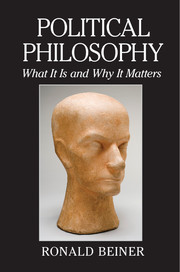Book contents
- Frontmatter
- Dedication
- Contents
- First Prologue: Horizons of Political Reflection
- Second Prologue: Freud, Weber, and Political Philosophy
- 1 Hannah Arendt: The Performativity of Politics
- 2 Michael Oakeshott: Life’s Adventure
- 3 Leo Strauss: The Politics of Philosophy
- 4 Karl Löwith: In Awe of the Cosmos
- 5 Excursus on Nature and History in the Strauss-Löwith Correspondence
- 6 Eric Voegelin: Modernity’s Vortex
- 7 Simone Weil: The Politics of the Soul
- 8 Hans-Georg Gadamer: Philosophy without Hubris
- 9 Jürgen Habermas: Politics as Rational Discourse
- 10 Michel Foucault’s Carceral Society
- 11 Alasdair MacIntyre: Fragmentation and Wholeness
- 12 Short Excursus on the Rise and Decline of Communitarianism as a Political Philosophy
- 13 John Rawls and the Death of Political Philosophy
- 14 Richard Rorty: Knocking Philosophy off Its Pedestal, or the Death of Political Philosophy Postmodernized
- Epilogue: On Not Throwing in the Towel
- Index
- References
3 - Leo Strauss: The Politics of Philosophy
Published online by Cambridge University Press: 05 August 2014
- Frontmatter
- Dedication
- Contents
- First Prologue: Horizons of Political Reflection
- Second Prologue: Freud, Weber, and Political Philosophy
- 1 Hannah Arendt: The Performativity of Politics
- 2 Michael Oakeshott: Life’s Adventure
- 3 Leo Strauss: The Politics of Philosophy
- 4 Karl Löwith: In Awe of the Cosmos
- 5 Excursus on Nature and History in the Strauss-Löwith Correspondence
- 6 Eric Voegelin: Modernity’s Vortex
- 7 Simone Weil: The Politics of the Soul
- 8 Hans-Georg Gadamer: Philosophy without Hubris
- 9 Jürgen Habermas: Politics as Rational Discourse
- 10 Michel Foucault’s Carceral Society
- 11 Alasdair MacIntyre: Fragmentation and Wholeness
- 12 Short Excursus on the Rise and Decline of Communitarianism as a Political Philosophy
- 13 John Rawls and the Death of Political Philosophy
- 14 Richard Rorty: Knocking Philosophy off Its Pedestal, or the Death of Political Philosophy Postmodernized
- Epilogue: On Not Throwing in the Towel
- Index
- References
Summary
What Defines Straussianism
The first thing that needs to be said about Leo Strauss is that he is set apart from the other theorists treated in this book insofar as attitudes toward him divide between those who demonize him and those who worship him. For his followers, he is the definitive guide to how one does political philosophy – the “only Star and compass,” to borrow a phrase of Locke’s. For those who demonize him, he is a kind of Rasputin who secretly pulls the strings of world events, even to the extent of inspiring a war that erupted thirty years after his death! Let me say very directly that neither of these polarized attitudes – demonizing, worshipping – is an appropriate way to respond intellectually to a political philosopher, and in what follows, I am determined to treat him exactly as I treat the other thinkers who figure in this book – by giving him credit for helpful insights and criticizing him (exactly as we criticize the others) when he produces ideas that come up short with respect to coherence or persuasiveness. That is, he should be treated on exactly the same level as all the others, as neither a beast nor a god, borrowing this time a phrase of Aristotle’s.
Esotericism is the heart of Strauss’s political philosophy. It is his key insight; it defines the hermeneutical methodology he founded and propagated; above all, it animates his experience of intellectual life. It is normatively significant because it implies fundamental forms of (perennial) human inequality that pose a challenge to much of modern political philosophy. The issue Strauss raises, and intends to raise, is the existence of different and normatively incommensurable communities. The question is: who are the human beings with whom we can share the secrets that really matter, and why is it necessary for us to share these secrets only with these particular human beings and guard them from all the rest? The fundamental issue is nicely expressed in Allan Bloom’s statement that “[Strauss’s] politics were the politics of philosophy and not the politics of a particular regime.” What is “the politics of philosophy,” and why should it be philosophically privileged in relation to politics in a more conventional or more familiar sense?
- Type
- Chapter
- Information
- Political PhilosophyWhat It Is and Why It Matters, pp. 41 - 62Publisher: Cambridge University PressPrint publication year: 2014



